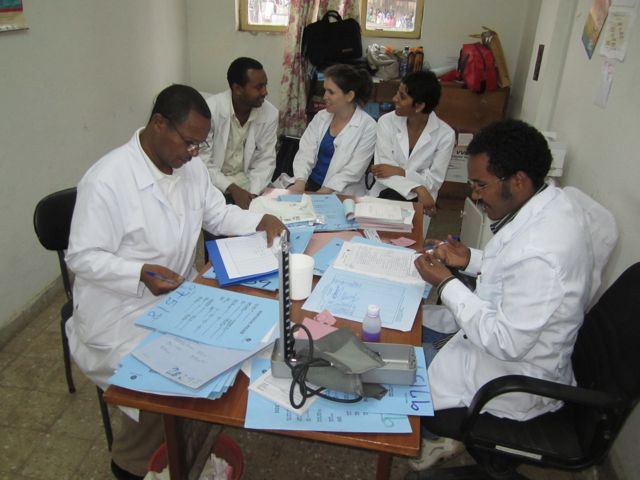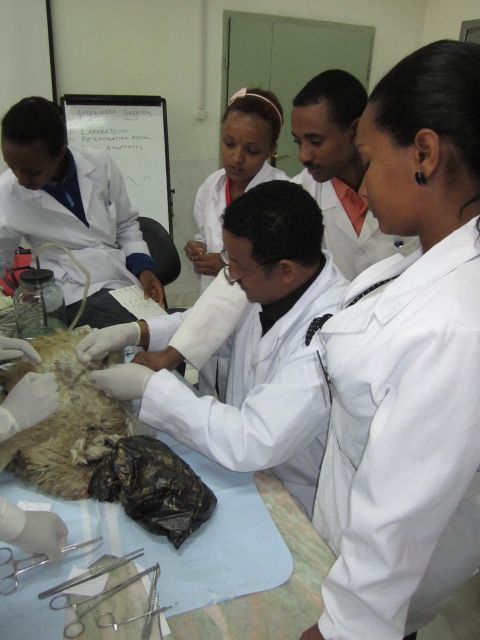Family Medicine in Ethiopia
 Photo: Residents discussing cases at health centre
Photo: Residents discussing cases at health centre
Ethiopia’s first family medicine training program was inaugurated in February 2013 with eight residents. It has just completed its first year and welcomed four new residents to the program. The completion of its first year was marked by the country’s first annual family medicine meeting attended by key officials from Ethiopia’s Federal Ministry of Health, Addis Ababa University and the Regional Health Bureau of Addis Ababa. Dr Perry Pugno, Vice-President of the American Academy of Family Physicians, delivered the keynote address, and faculty from collaborators at the University of Toronto and University of Wisconsin also attended.
In 2008 educators from Addis Ababa University (AAU) began discussions with counterparts at the University of Toronto and the University of Wisconsin to establish a family medicine program at the country’s largest university and teaching hospital, Tikur Anbesa (Black Lion) Specialized Hospital. A three-year curriculum was developed and approved by AAU.
Because there was no pre-existing discipline of family medicine from which to draw faculty, the University of Toronto offered to sponsor an academic family physician to work in Addis Ababa for the first year, joined by two other volunteer Canadian family physicians. They worked with key physicians at AAU under the direction of the Associate Dean of the School of Medicine to refine the curriculum and develop an entrance exam, objectives and evaluation methods. Five general practitioners sponsored by their employing hospitals became the first residents of the training program last February and were soon joined by three other GPs, including two who transferred from other specialty training programs. They were hailed as pioneers and acknowledged for their courage in embarking on training in an unknown discipline in their country.
 Photo: Residents participating in surgical skills course.
Photo: Residents participating in surgical skills course.
In addition to participating in specialty rotations at Addis Ababa’s major teaching hospitals, the family medicine residents provide care at one of Addis Ababa’s many community health centres one afternoon a week to develop their skills in community-based continuing care, and they participate in weekly academic half-day programs for seminars and case presentations. In addition, the residents have participated in specialized training courses in obstetrics, surgical skills, cervical cancer screening, HIV management and research methods. They will all complete a research study during their residency.
The potential contribution of family medicine to the Ethiopian health care system is immense. The country is growing at a rapid rate and its population is approaching 90,000,000. Many people still have difficulty accessing anything more than basic care provided by health extension workers with one year of training. The country’s doctor-patient ratio is extremely low, roughly one per 20,000 population, well below WHO’s recommendation of a minimum of one per 10,000. Ethiopia is making significant strides in closing that gap; the ratio was one per 40,000 only a few years ago. Ethiopia doubled its number of medical schools in 2012 by opening thirteen new medical schools using an innovative community-based curriculum, and will soon be graduating 3000 new physicians annually. The community-based curriculum should be an ideal foundation for attracting new graduates to family medicine.
There is currently a gap between the community-based primary health care system staffed mainly by health officers, nurses and midwives and its hospital-based GPs and specialists, who may be several hundred kilometres from some communities. The Federal Ministry of Health has not yet developed a clearly-defined role for family physicians, although it is very supportive of the principle of expanding family medicine in the country. It is easy to visualize family physicians in Ethiopia providing care for patients with more complex problems, providing emergency and routine surgical and obstetrical care, taking leadership in local health care facilities, playing a role in community and public health, and participating in the training of students of family medicine and other health care providers.
Ethiopia faces a number of challenges in developing family medicine to its full potential. As an unknown discipline it may have difficulty attracting medical school graduates. However, future graduates of the community-based curriculum will hopefully already have a community focus conducive to choosing a career in family medicine.
The scope of the country’s need for primary care physicians is immense, and Ethiopia would have to produce many hundreds of family physicians annually if it is to meet the needs of its current and growing population. Expansion of family medicine training to other medical schools and hospitals in the country will be required. Because family medicine is a new discipline in the country, developing teaching faculty is a major challenge. Residents in the current training program are being trained as future faculty, and some specialists in other disciplines may be recruited as family medicine faculty. Addis Ababa University’s collaboration with the University of Toronto and the University of Wisconsin to support its family medicine program works well and is a model that could be adopted by other universities in Ethiopia that want to develop family medicine training programs.
Family medicine training in Ethiopia is off to an auspicious start, and family medicine could play a very important and indeed essential role in the country’s health care system. The discipline is in its infancy in Ethiopia, and collaboration with international partners will be essential if family medicine is to achieve its potential to make a real difference in the country’s health care system and in the health of its people.
Brian M Cornelson, MD, CCFP;
Dawit Wondimagegn, MD;
Risa Bordman, MD, CCFP;
Solomon Shiferew, MD